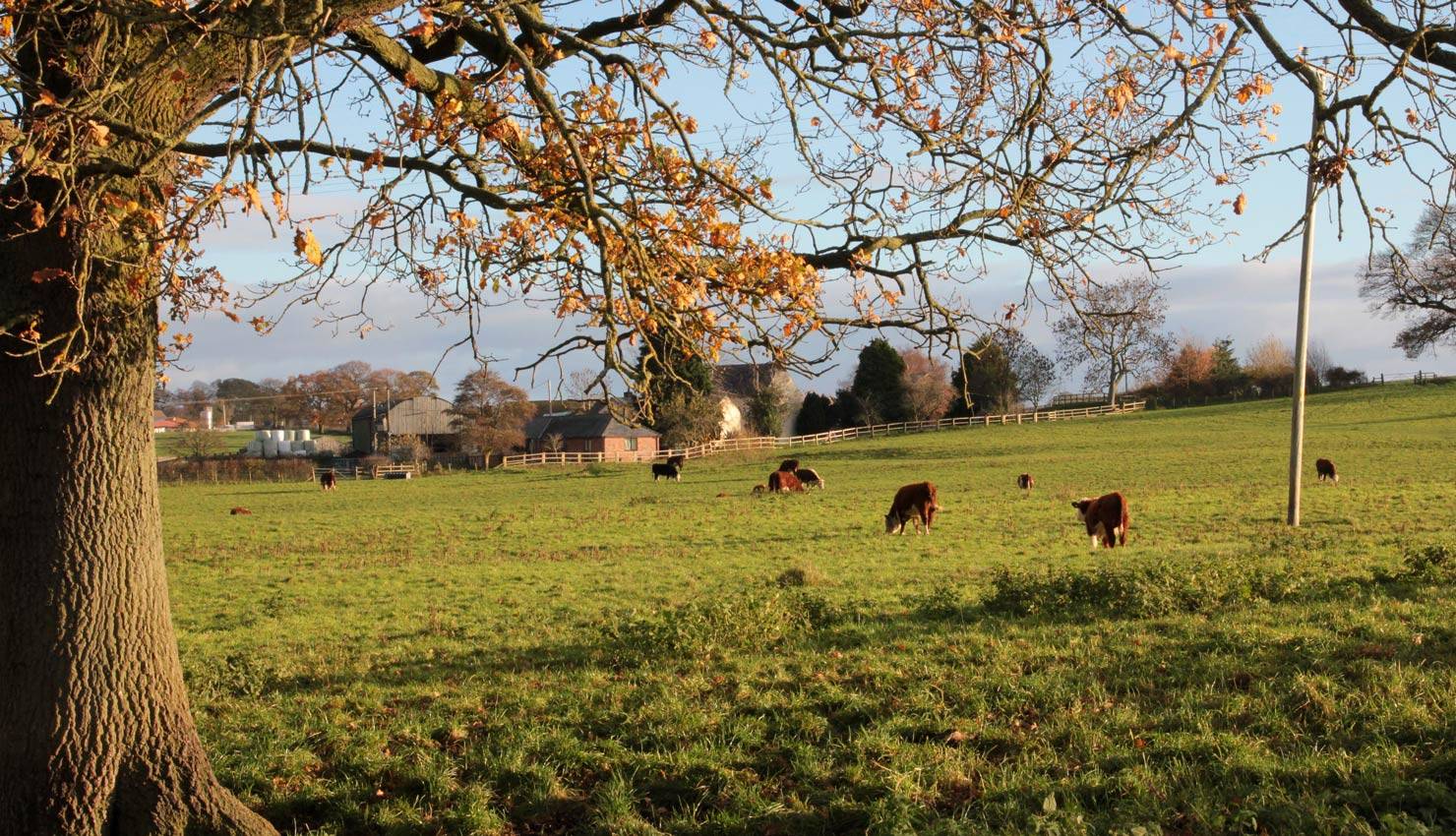Environment and Sustainability
At Millmoor we take our green policies very seriously. The farm is run without the use of artificial fertilisers and minimal sprays and chemicals. The cattle we have on the farm fall into two categories. The first are bought in calves that we hand rear and sell on at about six to eight months to other farms. As baby calves we feed them a whey-based milk powder which is a by-product of cheese manufacture. They also have home grown forage and a cereal concentrate which also has vegetable based by products such as soya hulls in it. The second group of cattle that we farm are our suckler cows which are mostly pedigree Herefords and Native crossbreed cows. The cattle produce one calf annually and feed that calf themselves until it is about eight months old. The cows do not have any bought in feed only grass and our own forage such as haylage. Because these cattle are native to the U.K they thrive here, and the older animals spend nearly all the year out at grass.
Because of the grazing management here that the suckler cows are part of this encourages species rich habitats for native flora and fauna. The farm also has a wide variety of soil types from clay to sandy loan and this helps keep the cattle and sheep healthy as they are grazing a variety of plants which ensures they pick up valuable trace elements from the soil.
Many of the calves we produce from the suckler herd we sell on to other breeding herds under the Chesmoor pedigree prefix. The ones not suited for breeding are fattened on the farm or sold onto other farms and these will eventually go for beef.
The other main livestock enterprise is the breeding flock of sheep which lamb in February every year. These are managed with minimal bought in feed and like the cattle are on a rotational grazing system. The grazing fields that we have here contain plants such as Chicory as well as grasses and clovers. The Chicory is a natural wormer for grazing livestock which means we don’t have to give medication to the sheep to control intestinal parasites. So, our fields produce food for the animals, medication in the form of chicory and plants rich in trace elements and shelter in the form of hedges and trees and water from our springs and ponds.
We are passionate about improving our hedgerows and woodland on the farm. Not only does this provide shelter for our livestock and fuel for our wood burners but the plants help to soak up CO2 from the environment. We have planted over a mile of new hedges in the last few years and plan to plant another mile in the next two years. The old railway line that borders the farm on the west side has been allowed to regenerate into native woodland and this is home to the farms largest badger sett. Because of the variety of trees, we get numerous bird species here also and the way we manage the hedges means these have a wide variety of fruits and berries to sustain them over the winter.
This management policy also extends to the farms ponds and streams with the old ponds being cleaned out and new ponds created. This has brought new species to the farm including Shell ducks and even an otter has been filmed here.
In 2021 we hope to start a new wildlife scheme and if we are accepted then we would be able to deliver even more environmental benefits.
It has to be remembered though that if it wasn’t for the grazing livestock, we would not have the species rich environment that we enjoy here and we would be reliant on chemical fertilisers to maintain productivity.
Regarding the holiday cottages on the farm, these have been built over the last fifteen years on brownfield sites within the farm. In some instances, we have used reclaimed materials like bricks and beams in their construction. All cottages have excellent insulation and Corn Store, Drovers Barn and Carters Lodge have underfloor heating which are powered by air source heat pumps. These extract heat from the outside air and are electric powered and very efficient. We in turn generate our own electricity from solar panels which means all the energy for all the cottages is produced carbon neutral.
Farmhouse Wing and Millers house have conventional oil heating and log burners which use our own timber grown on the farm. Dairymans cottage also has oil fired heating with an electric fire for additional heat.
Every year we plant more trees and hedging on the farm and this helps to reduce our own Carbon Footprint and that of our guests visiting us. If you are here during the Winter months and wish to help out with tree planting, please ask as David is always looking for help.
We are often asked about bins and recycling etc. We took the decision some years ago to employ a reputable local company to take on our waste disposal. They remove materials suitable for recycling from our collected waste.
During 2021 we put in a new water management system to divert clean rainwater from our roofs to a catchment pond. This will finalise our water management plan.

